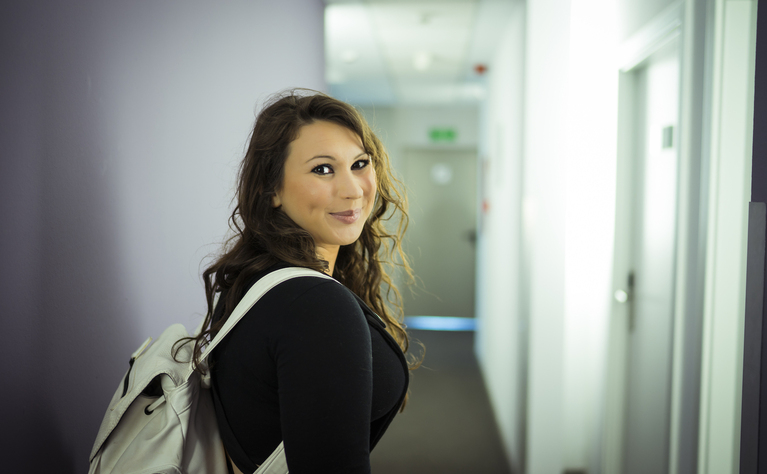Heading to university can be daunting for anyone - let alone when you suffer from inflammatory bowel disease (IBD).
In this article Simon Stones talks about living with IBD at university. You can also read his top tips on coping with IBD at uni.

So many people will tell you that your time at university will be the best years of your life ‐ new opportunities to meet friends for life, to have an amazing social life and kick start your career. Fresher’s week can be chaotic ‐ with more parties planned than you can keep track of! It can be challenging, as a person living with IBD, to say ‘no’ to some of these social events, after all, you want to fit in with your new friends as quickly as possible, and may not necessarily want to start sharing your IBD story before you’ve got to know each other properly! It is important to remember that your health is the most important thing ‐ there is no point in going out every night, if it is going to make you feel rubbish. Although it can be challenging, there’s absolutely nothing wrong with saying, ‘I’m going to give it a miss tonight’. You will very soon identify your close network of friends at university, whether they be people in your accommodation halls, or on your degree course, who will understand what you say. The nice thing about university is that people don’t really judge others; it’s not like school or college. Yes, you still get those ‘popular people’ and cliques, but there is less judgment and prejudice.

When you completed your UCAS application, you are likely to have documented that you have IBD. Your university faculty should be aware of this, and should automatically refer you to the university’s disability support and advice service ‐ each university will have one of these; however, the name of the support service may differ. If you aren’t automatically put into contact with them, it is worthwhile being proactive, and getting in touch with them. They will be able to meet with you, to learn about your needs, and put practical steps in place, to ensure you get the most out of your time at university.
There are a number of things they will be able to help you with. You may decide that you want to stay in a university halls that is near to your campus for your entire time at university, so they will be able to help put this into place. It is likely that you’ll want your own en-suite bathroom, so they will be able to ensure that you receive priority for these rooms too. They will also be able to offer advice about parking spaces on campus, if you need to use a car, and any practical issues about moving around university. You’ve got to remember that you are dealing with a pretty nasty condition, and so you want to iron out any issues that could stress you out, and make you feel worse.
You should also think about support for the academic side of university. Whatever degree course you will be studying, you are likely to come across exams! Universities can offer a number of options to help you get through these naturally stressful experiences, such as sitting your exam in a separate room to everyone else, particularly if you need to rush to the toilet, or experience whale noises from your stomach! Living with IBD does also affect your memory and concentration, and sometimes you just need a break during an exam to focus, and get back onto task. There are a variety of options that are available to you, such as extra time in exams, rest breaks and the availability of a scribe, to help minimise the impact of IBD on your performance, enabling you to achieve what you are capable of. Even simple changes, such as a comfortable chair, or having a warm drink, can make all the difference to someone living with IBD ‐ so be confident, and ask. You must look after yourself, and make ‘you’ your number one priority.
Your personal advisor at university will be one of your few personal contacts whilst studying at university, and they can be really helpful in many situations; but you must talk to them and explain how you are feeling. Unfortunately, they aren’t mind readers, and although you try to get on as best as possible, it’s fine to admit that you may be struggling, or aren’t feeling well. They are there to support you. They will be able to liaise in getting deadline extensions, mitigating circumstances, and liaising with your lecturers, should you need to do so, so that people are aware of your circumstances, and are understanding of what you have to go through.
It can be highly embarrassing if you have to run in and out of lectures, to get to the loo. The noises your stomach makes aren’t the most flattering sound either! This may not be too bad if you’re in a large lecture theatre, but can be trickier if you’re in a small room, stuck in the middle of a row of seats. Thinking ahead, just in case, can be really helpful, and will help to minimise the embarrassment. You may want to drop your lecturer an email before the lecture, just to warn them that you’re having a bad day and may need to run out, tell your friends that you’re not feeling very well today, and think about sitting near the end of a row, perhaps towards the back of the room, so you can quickly and discretely slip out of the room. These steps, although trivial, will make a difference, helping you to feel less stressed. There are days when you just do not feel like getting out of bed, and sometimes, you have to hold up your hands and say, I need to stay at home today. Many universities offer podcasts, so you can watch your lectures online, and most upload presentations and documents to online learning platforms. It’s fine to do this when you need to, and you should email your tutor or lecturer to also explain ‐ you’ll be surprised how supportive they can be.

It may not be high on your agenda of things to discuss around the table with your new friends at university, but it’s something you really need to do! It may be daunting at first, trying to find the right time to bring it into the conversation, but just be honest ‐ your friends (if they are true friends), will not be bothered at all. So many people live with health conditions at university, and people see beyond that ‐ they see you as an individual, as a friend. If they know about your condition, they will be aware if you’re not feeling well, or if you need support. You’ll often inspire them, by sharing your journey with IBD, and how you’ve achieved so much to be where you are today ‐ so keep your head held high, and be proud of yourself!
Embrace and enjoy your time at university. It is a fantastic opportunity to try new things, meet new people, and grow as an individual ‐you get to have all the fun, without any of the responsibilities! Soon, you’ll be graduating and wish you could be a student all over again!